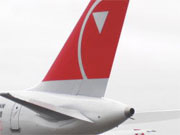Audio
Photos
More from MPR
| ||||||||||||||||||||||||||||||
 |
| Members of a class at Dakota Technical College learn the technology necessary to work on machines in processing plants, or rides at the Mall of America. (MPR Photo/Annie Baxter) |
St. Paul, Minn. — It's about 8:30 on a weekday night, and eight guys are clustered inside a classroom at Dakota County Technical College in Rosemount. The room is a collection of the kind of stuff you might have lying around your garage and aren't sure what to do with: TV monitors, motors of all shapes and sizes, appliance parts.
The guys are hovering over a motor part called a squirrel cage rotor. And they're studying it as though it were a fine gem, until they pull it apart.
This is a manufacturing maintenance class; they're learning the technology necessary to work on machines in processing plants, or rides at the Mall of America.
Those kinds of jobs are looking pretty good to a lot of the guys in the class. Several are striking Northwest mechanics. A couple were laid off from the airline earlier this year.
Dave Spaeth, who's on strike, says he's not sure if this class will lead to a job change, but at least the subject matter is close to what he knows.
"I like doing motor work. I was an electrical mechanic; that's where my heart is. That's where my abilities are. I'm hoping i'm doing the right thing. I'm a praying individual; I pray a lot. If it doesn't work out, I guess I continue education. And I just try to get a job and feed my family, and do the best I can," he says.
The instructor, Dave Rich, says that the Northwest mechanics can make the transition easily into other fields because they already have a base of knowledge in key areas of mechanical systems.
"They have mechanical, hydraulic, pneumatic, and electrical. So they have all four normal processes. Plus they're trained on how to think of it as a system, from the sensors all the way through the control to the final output device," according to Rich.
Rich says he's taught more than three dozen Northwest mechanics in the past couple of years, and all of them have found jobs locally at companies like Boston Scientific, Conagra, and Kemp's.
Rich says the jobs are out there, but the pay doesn't quite match what aircraft mechanics are used to.
That point is borne out by state labor market data. State labor analyst Steve Hine says industrial machinery mechanics in Minnesota tend to make a couple dollars less per hour than aircraft mechanics, and automotive mechanics earn about $7 less per hour.
But on the positive side, Hine says both of those fields show strong job growth potential in Minnesota. That's according to a 10-year state forecast developed in 2002, which projected a bleaker outlook for aircraft mechanic jobs compared to most.
"Even prior to the difficulties at Northwest we had projected a job growth in the aircraft mechanics occupation of something about half the statewide average," according to Hine.
Still, there are jobs to be had, according to Jeff Dyerood, an airframe maintenance instructor at Northland Community Technical College in Thief River Falls. He says some airlines are hungry for mechanics, but they're not looking for the seasoned mechanics you might find on Northwest's picket line. Instead, Dyerood says there's a big market for entry-level mechanics.
"There are less schools operating in the U.S. now, and there are less students going to them, so some of those entry-level jobs at lower pay where you start off and pay your dues, they're sometimes having a hard time finding people," he says.
Several of the Northwest mechanics at Dakota County Technical College say it's hard facing the prospect of lower-paying jobs. At Northwest, some were at the peak of their earning potential because of their seniority, and because Northwest mechanics salaries are higher than the industry average.
But for mechanic Barry Alpern, switching careers will cost him more than just his salary.
"I don't think anything will be as fun as the job I just left. The reason I enjoyed it was everyday there was something new to learn. And I enjoyed the people; not only fellow mechanics, but the pilots and flight attendants," he says.
For now, Alpern says, the class he's taking in manufacturing maintenance is giving him something to fall back on. Even if he does go back to Northwest, he says a little education can't hurt.







